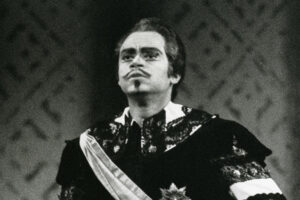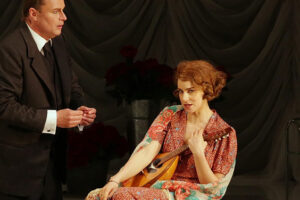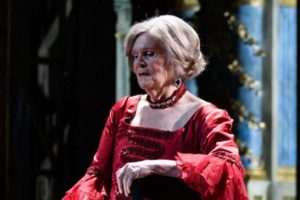

Premiered in 1934 in Leningrad, the piece enjoyed, initially, both critical and public praise, a contrast to the tepid receptions of some of his previous symphonies and The Nose. However, after a 1936 performance of Lady Macbeth at the Bolshoi attended by Stalin, the piece was seized upon by the Communist Party to denounce “bourgeois” music similarly to the “degenerate music” crackdown happening in Hitler’s Germany around the same time.
With the opera denounced as “coarse, primitive and vulgar” as well as “formalist” in an article in the party’s newspaper, Pravda, the denunciation kicked off a reign of terror perpetrated against Shostakovich’s friends, family, and patrons.
First presented at the Met in 1994, Graham Vick’s production returned for the first time in nearly 15 years on Monday night. The production gets the job done—though with the many recent changes in Russia and Russian culture, it would have been more interesting to see how a new production of the quintessentially Russian piece treats the story. For this cerebral tragedy of suburban proportions, the staging utilizes every inch of its slanted set with constant movement of people. A few pieces of furniture suffice to convey the inherent drama in the piece.
A mural of a cloudy sky on the walls blurs the lines between inside and outside as people pass in and out of the Izmailov house, leaving Katerina to clean up after them, stimulate them, or a little of both. Heavy machinery onstage created a construction-site feeling that made the lugubrious atmosphere and sexual harassment that’s so central to the piece feel very feasible.

In the title role, Eva-Maria Westbroek brings the goods in spades. For the past decade, this role has been a calling-card of hers and the role of the violent housewife fits her like a glove. Vocally, it’s all there. Her middle voice is liquid gold and she easily negotiates the shrieking outbursts of the piece in the strident upper part of her voice. Only in a floated high pianissimo in the first act did the voice show signs of a very slight wobble. Dramatically, her comfort level with Russian relieved her to use her full arsenal of dramatic capabilities. From her incessant heel-fidgeting to the twisting of her wedding ring on her finger, this was one of the most compelling and complex dramatic interpretations of any role that I’ve seen.
Her paramour, Sergei, was sung by Brandon Jovanovich. Though the voice isn’t particularly distinctive, he gave a well-sung and dramatically committed portrayal of the cocky laborer. He was still a step below Westbroek (literally and dramatically- EMW is around 6 feet tall), but could definitely grow further into this role some more over time.
Boris, Katerina’s boorish father-in-law, was rendered in complete sliminess by Anatoli Kotscherga. His classic eastern-European bass boomed through the house with thrilling vocal colors that ran from whines to growls. With lumbering, fanatical physicality and a sleazy costume to match, he matched Westbroek on every level. (Speaking of costumes, Brown’s designs were unobtrusive yet a consistent reminder that this is a suburban tragedy and Katerina Izmailova could be your neighbor.)
In the smaller roles, Raymond Very brought a high, reedy tenor to the role of Katerina’s husband, Zinovy. Mikhail Kolelishvili’s strong voice and lanky proportions in the role of the Priest provided the necessary comic relief in an opera that can sometimes feel as depressing as all of Anna Bolena. Holli Harrison made the most of Aksinya, a small but complex role, and Tyler Duncan provided a well-sung Millhand. I doubt that many people in the audience were sad to see the small-voiced Oksana Volkova’s Sonyetka be dragged down into a cistern, though she made the most of her short role with nuanced physicality.
Russian operas put many demands on a chorus, and the Metropolitan Opera Chorus consistently rises to the occasion. Both the men and women had their work cut out for them, acting as important, ostracizing characters in the drama and sporting a ton of costumes while doing it. Katerina is ultimately a victim of her situation, and under the glaring eye of the outside world, it all made clear sense why she feels so trapped.
James Conlon lead an organized and surging reading of the piece, though an occasional slip into disarray might not be the worst thing for a piece like Lady Macbeth. The Metropolitan Opera Orchestra was in top form with special props to the brass.
Though the Met is often criticized as a repertory house, it’s comforting to realize the high level of performances given to fringe works. Following the success of Macbeth with this revival, the Metropolitan Opera sends a message that ambition, passion and intensity are here to stay.
Photos: Ken Howard/Metropolitan Opera
























Comments